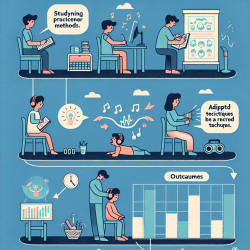In the world of special education, where every child's learning journey is uniquely challenging, the quest for effective teaching strategies remains at the forefront of educators' efforts. A groundbreaking approach, encapsulated in the research article "TALK- Teaching the American Language to Kids," offers a beacon of hope and a new direction for practitioners aiming to enhance their teaching methodologies and improve outcomes for their students.
The essence of the TALK program lies in its innovative application of foreign language teaching techniques to the teaching of American English to developmentally delayed children. This method acknowledges the complexity of language acquisition and proposes a structured yet flexible framework that educators can adapt to meet the diverse needs of their students.
Key highlights from the research include:
- Emphasis on Semantics: The program advocates for a focused teaching approach that addresses the semantics of language, ensuring that students not only learn grammatical structures but also understand the meaning behind the words and sentences they are learning.
- Form and Function: By distinguishing between form and function within language structures, the TALK program enables students to grasp the practical uses of language in communication, enhancing their ability to express themselves effectively.
- Developmental Sequencing: The curriculum is designed to follow a developmental sequence, allowing for the gradual and systematic building of language skills from simple to more complex structures.
- Engagement and Interaction: The program emphasizes the importance of interactive learning, encouraging students to actively participate in language exercises and apply their new skills in varied contexts.
For educators and practitioners in the field of special education, the TALK program not only offers a new perspective on language teaching but also provides a comprehensive toolkit for addressing the multifaceted challenges of language learning among developmentally delayed children. Implementing the outcomes of this research can lead to significant improvements in teaching efficacy and student learning experiences.
Furthermore, the TALK program's approach encourages educators to engage in continuous learning and adaptation of their teaching practices. By embracing the principles outlined in the research, practitioners can foster a more inclusive, supportive, and effective learning environment for their students.
In conclusion, the TALK program represents a pivotal shift in special education language teaching, one that acknowledges the unique needs of developmentally delayed children and offers practical, research-backed strategies for enhancing their language acquisition journey. As educators, embracing this approach can be a transformative step towards unlocking the full potential of our students, empowering them to communicate more effectively and confidently navigate their world.
For those interested in exploring this innovative teaching strategy further and implementing its outcomes in their practice, TALK- Teaching the American Language to Kids provides a comprehensive overview and practical guidance.










